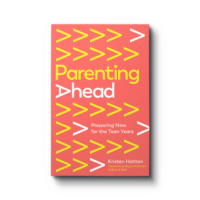
My boys were in elementary school when Pinterest first became a thing. I remember because all the class holiday parties went from basic snacks and traditional games to elevated everything. Every mom scoured Pinterest for the cutest, most creative cupcakes to take for a class party. Who would’ve thought we would look to the perfect cupcake (of all things) to give us worth? On the flip side, the perfect cupcake presented by one mom became the standard to which another mom believed she failed to measure up.
Comparison didn’t start with social media. Since the fall of man, we’ve looked to false sources for our worth. But with measuring sticks as ridiculous as a cupcake, in today’s world we seek our righteousness/ enoughness/worth/identity in just about anything and everything. Of course, it’s not actually about the cupcake (or insert whatever else you might measure your worth with), it’s what the “cupcake” can provide—attention, adoration, approval.
Whether we admit this or not, we want to be elevated to a god-like status in the eyes of others. Isn’t this (at least at times) why we post what we post on social media? We broadcast to the world when our child gets student of the month or some other award because we’ve attached our identity to our child’s success. (Not always—only you and God know your motive.) But often we feed off the praise for our child and feel better or more worthy ourselves.
Might this craving to feel our worth also be beneath our overparenting (at least at times)? Follow the logic—if our identity rises and falls in conjunction with our child’s successes or failures then micromanaging helps ensure they look good, which in turn makes us look good. For example, when one of my children nearly dropped the ball in getting his National Honor Society (NHS) application submitted, I came to the rescue. He was in the middle of his sport’s season with little after school time, which was my justification for interceding. But my motivation was driven by my desire for him to walk across the stage at the NHS induction ceremony, so he (we/ME!!) was seen by all. “I’m a good parent with smart kids” was my badge of righteousness of the moment.
Seeking our enoughness in and through our children will never fill us. We may feel great one day but the next day because of something our child did, we worry about what others think so we need another jolt of worthiness from something more. But as Paul Tripp writes in his book, Parenting, “The reason we look for identity in our children is because we are not resting as a parent in our identity in Christ.” If we were, we would see the foolishness of trying to attach out identity to anything other than Christ.
In Christ, we are viewed according to his perfect worth and work. He came as a man to achieve for us what we never could. He met God’s holy, righteous standard so that in him we could be set free from the law’s demands. He was enough so that we could live under God’s smile. We have God’s unconditional approval—not because of our performance, but because of what Christ merited for us.
Therefore, when our child misbehaves, messes up, doesn’t get accepted, isn’t the star, or with the “in” crowd, we have nothing to prove. Just as our worth is not dependent on our performance, it is not dependent on child’s performance (good or bad). Instead can cease striving and be at rest in a secure identity as a child of God. And when we’re at rest, our children too will experience less overwhelm and more rest, no longer bearing the weight of our identity wrapped up in them.
Excerpts from the post taken from my book, Parenting Ahead.

